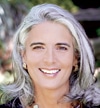by Maria Sirois
A few years ago, my younger brother, John, a doctor, died after a 10-week struggle with pancreatic cancer. In October of 2010, he flew north from his home in North Carolina to celebrate my 50th birthday with me. Within four months, I found myself standing in front of hundreds of his friends and colleagues offering a closing eulogy for his memorial service.
As I walked to the podium, my hands twitching from iron-heavy sorrow, a thought crossed my mind: How do we do this? How do we find the courage to bury each other or survive the myriad agonies of this world—batterings, car collisions, plane crashes, chronic illness, job loss, betrayal, loss of a home, a body part, a friend—and find our way back into life, more specifically back into a life that resonates with hope, and love and happiness? How do we rise, when darkness comes close?
This question is an old one in my world. I first found myself consciously asking it in my final year of training in graduate school while working as an intern at Dana-Farber Cancer Institute in Boston. There, with six other psychology interns, I met and treated scores of children facing cancer and other blood diseases and watched as some families fell apart and others became stronger. What did they know, those families who did well—who stayed mentally and emotionally intact, who remained present and were able to face reality while celebrating small moments of uplift—as their sons or daughters underwent treatments that in and of themselves might be fatal? And how did they find peace or a sense of happiness again once the battle with cancer had been lost? As a clinical psychologist, working in the field of death and dying, these questions were foundational to my work. What was it about those resilient families and how could I teach their wisdom to others?
In the last decade, my work has shifted to a related focus. I now travel extensively lecturing, teaching, and consulting about the intersection of positive psychology and resilience. My lectures focus on happiness, mindfulness, and the upward spiral of post-traumatic growth. My audiences have broadened to include professionals, business owners, work teams, volunteer groups, and adults of every age and stage. Still, at every event, almost everyone wants to know what those families at the Farber demonstrated: how to develop a deep capacity to grow even when life throws us its worst.
If I am honest with myself, though, these questions were in me long before that year of training at Dana-Farber. At 19, I witnessed the struggle of my aunt to love life after the loss of her youngest son, Tommy, to brain cancer. Before that, I felt the deep pull of sorrow surround our family when my father’s father died of myeloma. I was a toddler then, my parents still quite young themselves, and that loss fractured us for a time. I had a childhood bookended by cancer, and figuring out how to thrive after a death became a focus of mine along the current of my youth. Attention to what we know as the field of resilience came to define the work I’ve chosen, the books I’ve absorbed, and the friends I gather with; it is the gold I have sought in the mines of the living.
Walking up to the podium those years ago, holding my brother Johnny’s eulogy in my hand, seeing in front of me his teenage children, my parents, his wife, our older brother, and the sea of faces of those who he had treated and those he had loved, I knew that moment would change many of us. And I found myself praying as I adjusted the microphone and stilled my hands that it would change me for the good … that, if nothing else, I would learn something more about living with suffering, such that I might move back toward joy, and in so doing help others.
“There will be dying,” poet Derek Mahon writes, and sometimes, he suggests, there is no need to go into that. There are days, months even, when life is in flow and it shimmers; we can move through our days with a lilting ease. In those times of respite and beneficence, we do well to focus on the bounty around us and let lie for a time the great sorrows of the world. As we do so, we refill the well within us.
And yet, to find the sun that rises in spite of everything—in other words, to find our way into delight and uplift even as the pains of the world surge—we must do our best to choose happiness. We must actively choose resilience. We must elect to craft a life that thrives. And it helps to know how to do that.
Join Maria Sirois for The Resilient Quest, starting November 11, 2019.
Dr. Maria Sirois, PsyD, is Lead Faculty at Wholebeing Institute and an inspirational speaker, seminar leader, and author who has worked at the intersections of wellness, psychology, and spirituality for nearly 20 years. As a wellness guide, Maria has been invited to keynote throughout the country at conferences for wellness centers, hospitals, hospices, and philanthropy, business, academic, and corporate institutions, as well as for the general public. She has been called a “true teacher” and “an orator of great power and beauty.” She is the author of “A Short Course in Happiness After Loss (And Other Dark, Difficult Times)” and “Every Day Counts: Lessons in Love, Faith, and Resilience from Children Facing Illness”.



